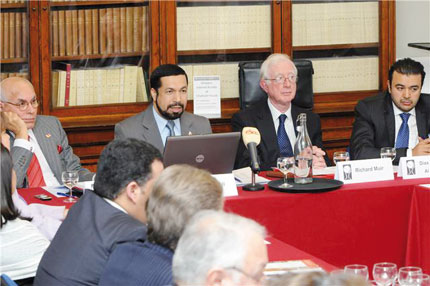
|
 |
 |
|
|
|
|
|
|
|
|
|
|
|
|
|
|
|
|
|
|
|
|
|
|
Wasted Opportunity at Chatham HouseAvoiding Second Party’s Questions.On 14 April 2010, a seminar on political reform and democratic
The speakers highlighted the positive aspects of the reform project in Bahrain since it began in 2000, as well as some human rights related issues including women’s rights, freedom of expression and relations with international organizations. The seminar provided a comprehensive picture of the Bahraini experience and the reform project, and was a positive effort aimed at highlighting the current margin of political, religious and media freedoms available in the country. However, presentation lacked suitable and impartial vocabulary which would have made it more convincing and acceptable to the participants. Also, discussing the positive aspects of the reforms is not sufficient, as there are many questions in the minds of foreign observers with regards to the political and human rights situation, which need to be answered. These questions should have had the priority in such a seminar, as its objective was not to paint a rosy picture of Bahrain, nor to counter certain propaganda by emphasizing the achievements of state, which are many. Rather, its aim was merely to provide a clear picture of the reality in Bahrain in various fields. This picture is a positive one, contrary to the rumours claiming Bahrain’s political and human rights experience is still incomplete and faces many obstacles and problems. This may be true, but it is also a real and positive experience, and we are all learning how to develop it. We refuse to deform this experience or present it in a way that opposes reality, as this does not help us as Bahrainis. Furthermore, foreign monitors will also reject any unrealistic portrait of issues. What the seminar really lacked was not an overview of Bahrain’s achievements, however important. Chatham House is an elite centre, and as such the participants in the seminar required more than just a general presentation of Bahrain’s record in developing its political, economic, judicial and human rights system. They are also not in favour of a one-sided, stereotypical picture, and do not accept propagandistic language. Even the most perfect of achievements could not be marketed in such a language. In addition, the level, depth and freedom of the debate should have been at the same level of debates in the local media. It is illogical that we have become less keen in discussing our issues when we are abroad than when inside the country! The foreign media is interested in exactly the same issues that are being discussed in the local media. It would have been much better if the panel had addressed some of these issues such as: does the Press Law restrict freedom of expression? What about allegations of torture, illegal detention and blocking internet websites which westerners believe are political and human rights websites? Also, questions about the true extent of the use of excessive force and the reasons behind it as well as the issues of violence, the problem of sectarian discrimination and restrictions of the activities of human rights activists and institutions. Moreover, there are also many political questions related to the reform process, such as: is there political stability in the country? Why is street violence continuing? Why has the reform process reached a deadlock? Why has the Legislative Authority been described as weak and restricted due to the existence of an appointed Shura Council? And finally, why is there insufficient cooperation between the Legislative and Executive authorities? These questions are of particular interest to foreign public opinion, and have frequently been raised in political and human rights reports and foreign media. They should thus be discussed within the framework of the country’s overall political change, and in a positive spirit of openness and honesty. If these subjects were raised for discussion, people at the receiving end would be better able to understand them and appreciate the achievements that have taken place. |
